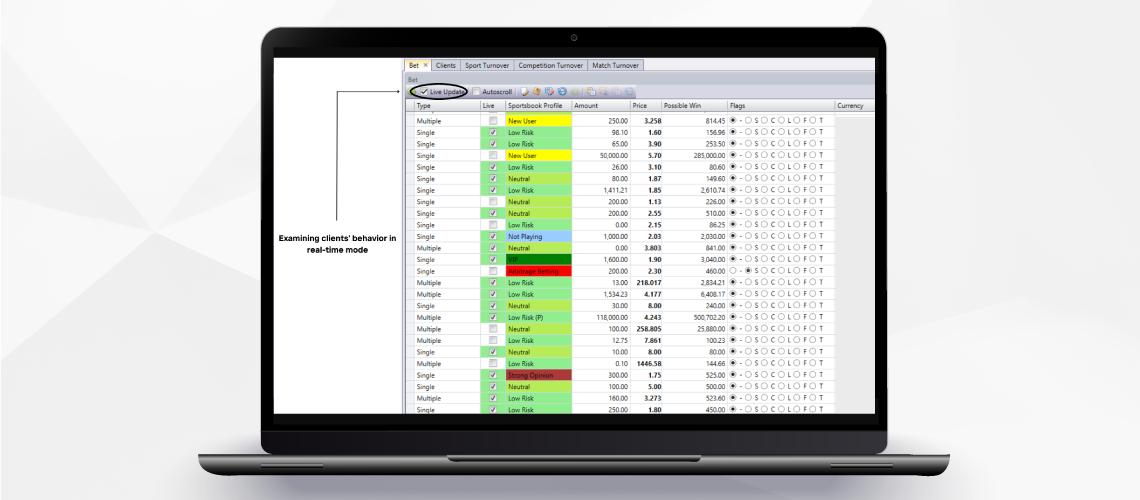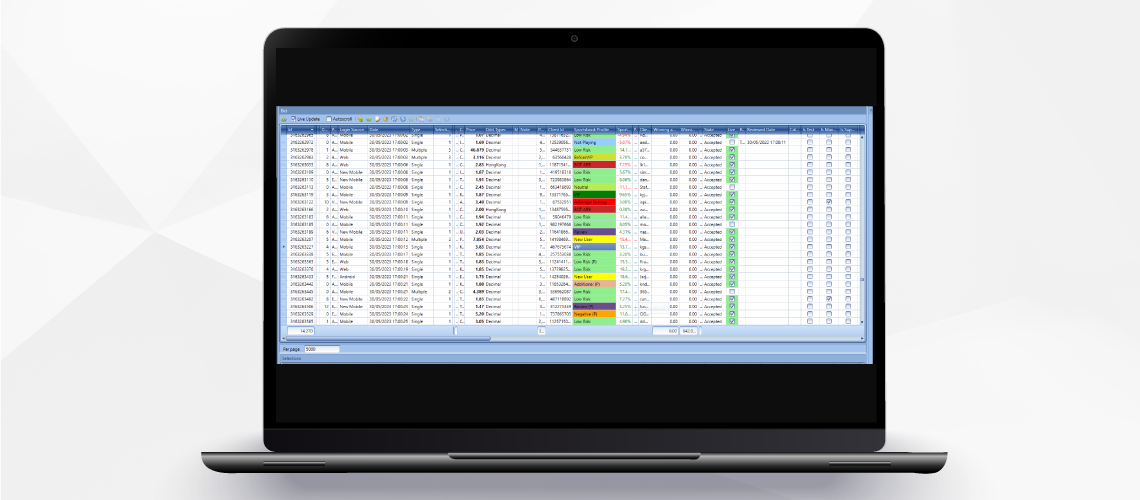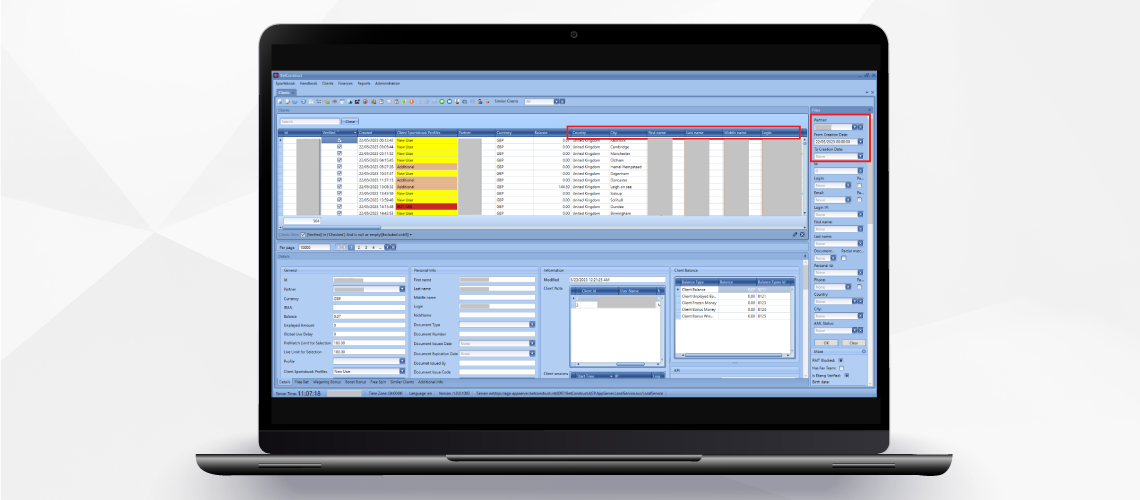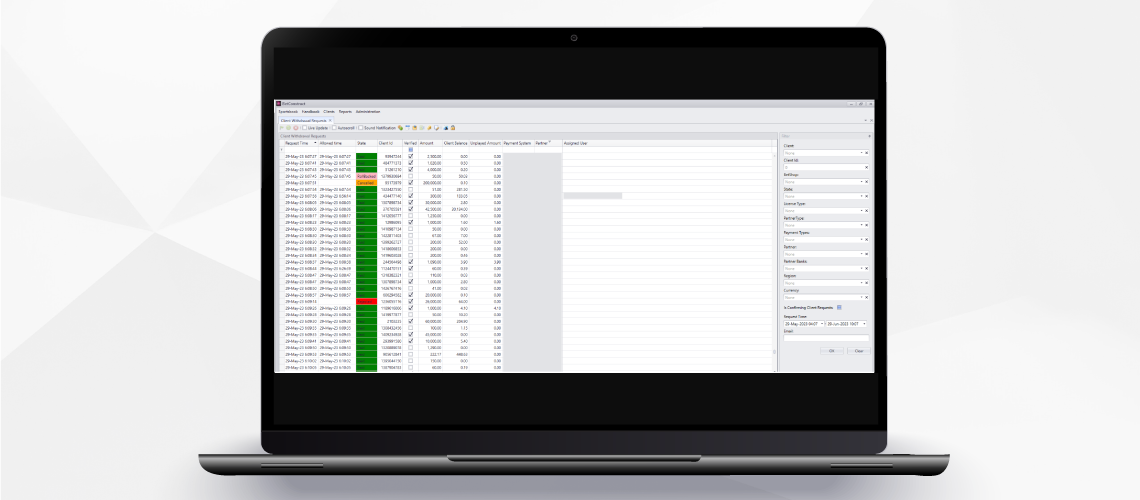The online sports betting industry has earned a leading position in the iGaming market, driven by the legalisation of gambling activities in multiple countries and the overall popularity of online bettings. This phenomenon can be hard to grasp for newcomers wanting to understand how to start an online sportsbook when taking into account the major risks and dangers the sportsbook businesses can face every day.
And despite the mentioned above, sports betting operators have continued to thrive for decades. So what’s their secret, and how can you implement it in your own business?
The answer is simple; sportsbook risk management is the base of every sports betting business. It’s the best way to protect your business from any type of risk or losing huge amounts of money.
But what is risk management?
In its essence, risk management involves identifying, assessing, and ranking potential risks, then taking appropriate actions to minimise, monitor, or control their likelihood and impact. By doing this, individuals and organisations can reduce the chances of negative events occurring, while also maximising the prospects of positive outcomes.
As we mentioned above, risk management in sports betting starts with identifying the type of risks you can face in your business. Only after knowing what threats to keep an eye on, can you take the correct actions to prevent them. So, let’s first discuss the types of risks sports betting businesses should be aware of.
Table of Contents
Types of Risks in Sportsbook Management
Recognising all potential risks beforehand is the most crucial step in sports betting risk management. It’s important to fully understand what types of risks and threats you can face in your business. Primarily, three main types of risks can threaten sports betting businesses. Let’s discuss each of them more thoroughly.
Operational Risks
Operational risks are the risks and threats you can face regarding your everyday business operations.
Those operations include:
- Technology failure
- Human error
- Player fraud
Technological failure presents one of the greatest risks for bookmakers as it requires constant attention, time and resources to keep it under control. Programs and software can unexpectedly crash and the bookies need to amend the situation in the shortest amount of time.
Human error is another threat for sports betting operators, as it’s much harder to control it. It can be caused in every operation involving a human touch - from your employees making a mistake to customers who misunderstand the instructions.
Last but not least, fraud is an operational risk requiring your attention. It includes both customers cheating on the program, as well as employees stealing from inside the company.
Player fraud is much bigger than you may expect. Conditionally, we can divide it into three categories:
- Multiple Account Bettors - bettors that place multiple wagers from different accounts are potentially cheating the system. Most of the time, they place bets directly contradicting one another, so they win despite the game results.
- Late Bettors - accounts that bet on the event at the last minute, just before or after the event starts, can be fraudulent and may require some extra attention. Oftentimes, they get inside information about the game just minutes before the bookmaker can change the odds, or they take the opportunity to place the bets at inflated rates before they get changed by the operator.
- Arbitrage Betting - arbitrage betting is a gambling tactic where the bettor examines the odds between different bookmakers and places wagers on all possible outcomes to gain profit regardless of the outcome of the event.
Financial Risks
Financial risks are the threats your business can face regarding financial operations. Those risks include cash flow management, losses, revenue and regulatory risks.
Cash flow management is one of the most crucial financial risks for bookies. If not managed properly, bookmakers may not have enough assets on hand to cover all their expenses.
Loss management is another financial risk you can face as a bookie. To accurately calculate your losses and avoid risks, you have to set limits on wagers and manage the exposure to certain customers or betting markets.
Regulatory risks are one of the main concerns of gambling businesses. Depending on your location and where you operate, you may face constant changes and regulations from government authorities. It’s crucial to stay aware of every regulatory update and requirement. Otherwise, you may face fines and extra fees and even lose your licence.
Reputational Risks
As a bookie, your reputation is very important for the success of your business. If your reputation is good, you are likely to have loyal customers, comply with regulations and attract new customers. However, there are certain risks that can damage your reputation.
One of the biggest risks is making fraudulent operations or other illegal activities. If your customers think that your business is involved in such activities, your reputation can improve and you may retain customers. To prevent this, you need to have strong internal controls in place and communicate them clearly to your customers.
Another risk is customer complaints. If your customers are not happy with your services, they may write negative reviews or speak negatively about your business to others.
Main Sports Betting Risk Management Challenges
The biggest challenge for sportsbook risk management lies in tailoring risk management strategies to suit the unique needs of each company and target market.
You need to implement customised risk management strategies based on the specific framework conditions and requirements of different markets and player groups. For instance, legal frameworks and compliance requirements can differ significantly from country to country. Therefore, crafting risk management strategies that comply with these conditions is crucial, ensuring long-term growth and security.
Another critical challenge to consider is ensuring that the risk management strategy aligns with the corporate goals. This means that short-term and long-term goals should be aligned for the overall benefit of the company. Coordinating with the marketing team can help align these goals, prioritising the long-term viability of the entire system.
One more challenge is on the technical side. The best sports betting risk management software is equipped with the appropriate systems and tools to ensure the professional and secure implementation of risk management processes. And you, as a bookie, should understand these tools and techniques to achieve greater success in sports betting.
How to Improve Your Sports Betting Risk Management
After identifying the risks, as well as understanding the challenges your business can face, you can then process planning and executing your risk management program. There are several steps you have to take, which we will discuss further.
Risk Evaluation and Planning
Risk management should essentially answer two main questions:
- Who is your bettor?
- What are they betting on?
For accurate risk management, the bookmaker should gather accurate statistics about their target players and take into consideration the events they may want to bet on.
There are two scenarios for bookies to identify their bettors. In the first case are players with a long user history on the bookmakers' online sportsbook software. Identifying the betting patterns of such customers is pretty easy, as bookies can categorise them using platform analytics.
Usually, long-term bettors fall into three categories:
- Normal customers
- Winning customers
- VIP customers
Categorising and identifying relatively new customers is much tougher in comparison. Bookmakers won’t have in-depth knowledge about their betting habits and will have to closely watch their moves to identify the fraudulent ones. In this scenario, you have to rely on betting risk management software to do the job.
Best risk management for sportsbook software can help with:
- Accessing each potential risk
- Categorising and prioritising them based on likelihood and impact
- Creating a risk analysis strategy to regulate the level of risk
Determining the risk of each event is another process you should keep in mind. Different events hold different risks for operators. Some of the most significant factors you should consider include:
- The quality of the odds compiler
- The event's profile (high or low) and how much information is publicly available
- The impact of an injured participant that could be critical in some sports (e.g. tennis) but minimal in others (e.g. football)
- The sources of information used to price live betting events, as operators may have limited access to certain information
Fraud Prevention and Detection
As we mentioned above, there are three types of risks you should be aware of three types of risks. And there are certain tactics suitable for each of those threats.
Handling risks related to technology failure can be easier with a backup system. Ensure to have both primary and secondary technology systems, so one can replace the other in emergencies.
Although being unable to control fully, you still can prevent human errors in most cases. To achieve smooth operations between employees, make sure to create a seamless workflow among them. Make all your processes clean, determine a set of rules and regulations for all employees and train team members to follow them. Don’t forget about your onboarding process; get people acquainted with your company rules right from the start.
To get protection against fraud, make sure to get the best internal systems. Monitor both your players and employees accordingly. Get the risk management software for sportsbooks to identify suspicious betting patterns and balance your potential risks fairly.
To avoid reputational risks, you need to have strong internal controls and communicate them clearly to your customers. You should provide excellent customer service and address complaints in a timely and professional manner.
Using Technology for Sportsbook Risk Management
As a bookmaker, you get 2 main options to handle your risk management process. You can either build your own risk management systems or use a third-party risk management tool. Both options have their unique advantages and requirements, so you have to pick an option best suited to your business and company goals. Let’s examine each a little more.
Building Your Own Risk Management Solution
To keep your company safe from fraud and mistakes and to avoid losing out too much to bettors, it's important to have professional risk management and KYC (know-your-customer) processes in place. One way to manage these risks is to develop an in-house solution staffed by trained bookmakers and risk managers who monitor customers, games, and bets 24/7.
This can be done by hiring professionals with experience in risk management. While handling risk management in-house provides maximum control; it can also be expensive and require a lot of staff.
Before implementing any risk management strategies, testing and validating them is important to ensure they are effective. This requires significant resources and time, but it is an effective tactic if you have the means to manage it properly.
Use a 3rd Party Tool for Betting Risk Management
As we mentioned above, developing a risk management system in-house can be time-consuming and costly. That's why many operators prefer outsourcing to professionals who have experience in creating risk management solutions.
Outsourcing your risk management to a software provider allows you to benefit from their years of experience and well-shaped skills. They can help you identify and assess risks in your platform and internal operations while you can handle other operations of your company. It can help you optimise every operation along the whole risk management process.
Risk management tools can help you with:
- Fraud prevention
- Money laundering prevention
- Customer identification
- Customer protection
By outsourcing, you can significantly reduce the size of your team, and employees can focus on other important tasks, such as determining the sports betting offer for the platform and handling exceptional cases. This option allows you to free up time and resources to focus on growing your business.
If you want to trust your risk management to professionals, BetConstruct has a huge list of offerings to help you ease the whole operational process. You can learn more about each of them below.
Safeguard Your Operation with BetConstruct Tools
BetConstruct offers a vast range of risk management tools catering to every business's needs. Whether you want to integrate a full risk management package or outsource some services, you can find a suitable service for your requirements. Now, let’s get to know BetConstruct’s arsenal of risk management tools a little closer.
Sportsbook Risk Management Services

BetConstruct’s Sportsbook Risk Management service is the ultimate package for full risk management in sports betting. It’s one of the must-have products for every operator owning a sports betting business.
The list of offerings includes:
- Customisable risk management per partner
- Service price flexibility
- Direct communication with partners
- Generated alerts
- Monitoring player behaviour patterns and applying individual restrictions
- Reporting on services provided
- Player detection based on needed criteria
- Possibility to terminate the service at anytime
BetGuard

BetGuard is a combination of Odds Feed and Risk Management Service that offers secure, more flexible operations to control your bets.
Some of the most significant key features of BetGuard are:
- Real-time bet monitoring
- Sportsbook liability and limit management
- Constant performance analysis
- Margin evaluation and management
- Player risk profiling
- Reporting
Player Verification Services

The next service is a complete online gambling verification solution against falsified documentation and suspicious player activity. It suggests multiple KYC (know-your-customer) processes to ensure maximum security and player identification.
The most significant key features of the service include:
- Customisable verification per partner
- Service price flexibility
- Direct communication with partners
- Individual approach to players
- Reporting on services provided
- Double checks
- Usage of technical tools to detect falsified documentation
- Possibility to terminate the service at any time
Payments Risk Management

Last but not least, your business may need a sportsbook payment risk management tool to ensure safe and seamless payment processes on your platform. The service is crafted to perfection with the help of a professional team, a huge database and expertise with over 500 payment methods.
Key features of the service include:
- Customisable payments per partner
- Service price flexibility
- Direct communication with partners
- Individual approach to players
- Reporting on services provided
- Using the “closed loop” method
- Automatic checks
- Possibility to terminate the service at any time
Final Thoughts on Sportsbook Risk Management
In conclusion, effective risk management is the foundation of a successful sports betting business. It involves identifying, assessing, and ranking potential risks, then taking appropriate actions to minimise, monitor, or control their likelihood and impact.
The three main types of risks in sportsbook management are operational, financial, and regulatory risks, each with its own set of challenges. The biggest challenge for sportsbook risk management is tailoring risk management strategies to suit the unique needs of each company and target market.
To improve your sports betting risk management, you should identify the risks, understand your business's challenges, and process planning and executing your risk management program. By doing so, you can minimise the chances of negative events occurring and maximise the prospects of positive outcomes, ensuring your business's long-term growth and security.
And if you need an extra hand to manage some of your risk management operations, you can always trust BetConstruct with all your processes.
















